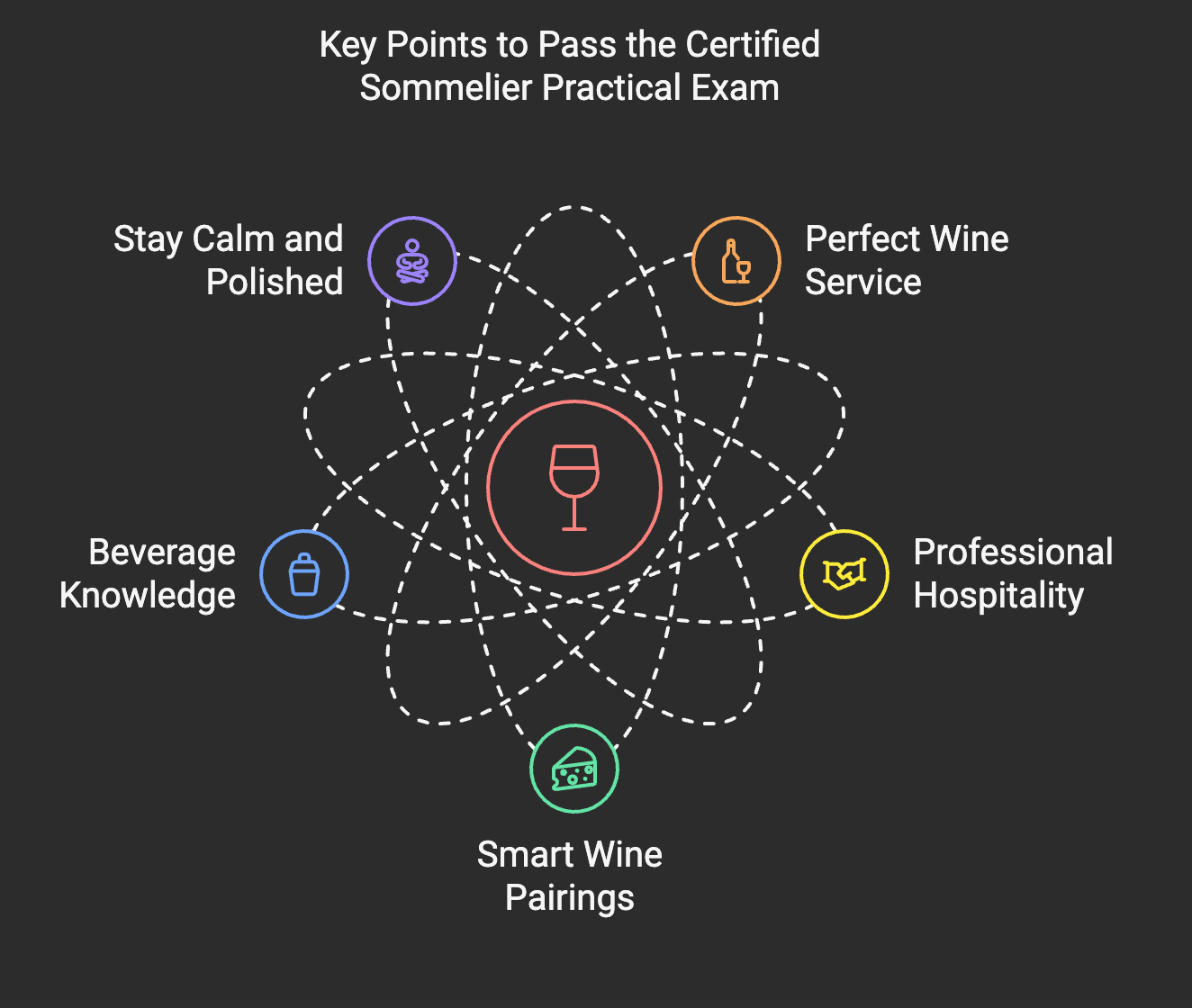What is the Certified Sommelier Practical Exam?
The Practical Exam is one of the three sections of the Certified Sommelier Exam, designed to evaluate your ability to perform the duties of a sommelier in a professional restaurant setting. It focuses on hospitality, technical service skills, and wine knowledge.
This portion of the exam simulates real-world scenarios, requiring you to demonstrate not only your technical expertise in wine service but also your ability to provide an exceptional guest experience.
The examiners ( Master Sommeliers ) act as guests, and you are expected to approach the tasks with the same professionalism, confidence, and grace you would in a fine dining environment.
This section is critical because it tests your ability to apply your theoretical knowledge and tasting skills in a practical, guest-facing context. It’s not just about opening a bottle or recommending a wine—it’s about creating a seamless, polished, and memorable experience for the guest.
How Does the Process Work?
The Certıfıed Sommelier Practical Exam typically lasts 16 minutes and is divided into several key components:
Wine Service:
You will be asked to open and serve a bottle of wine, which could be still or sparkling. The examiners will observe your technique, precision, and ability to handle service tools gracefully. For sparkling wine, you may also be required to pour evenly into 8 glasses, demonstrating your ability to manage portions and maintain balance while carrying a tray.
What They’re Looking For: Clean and efficient service, proper etiquette, and attention to detail. Mistakes like spilling wine, making loud noises, or fumbling with the cork can cost you points.
Wine Pairing Recommendations:
You will be presented with a dish (e.g., roasted duck with cherry sauce, grilled salmon, or braised lamb shank) and asked to recommend a wine pairing. Your recommendation must include:
Region: Old World and New World options.
Producer: A specific producer name to show your depth of knowledge.
Vintage: A thoughtful vintage choice that aligns with the wine’s style and the dish.
What They’re Looking For: Your ability to think critically, explain your reasoning clearly, and provide a pairing that enhances the guest’s dining experience.
Guest Interaction and Hospitality:
Throughout the exam, the examiners will assess your demeanor, professionalism, and ability to engage with the guest. This includes how you present the wine, your tone of voice, and your ability to anticipate the guest’s needs.
What They’re Looking For: A warm, confident, and polished approach. You should exude hospitality and make the guest feel valued and cared for.
Knowledge of Cocktails, Spirits, and Beverages:
You may be asked questions about classic cocktails, aperitifs, digestifs, or beer styles. For example, you might need to describe the ingredients of a Negroni or recommend two producers of Single Malt Scotch. This tests your versatility as a beverage professional.
Advice for Success:
Practice, Practice, Practice:
Rehearse opening still and sparkling wines until it becomes second nature. Practice pouring evenly into multiple glasses and carrying a tray with confidence.
Role-play guest interactions with a mentor or colleague to refine your hospitality skills.
Know Your Producers and Regions:
Be prepared to name specific producers and vintages for wine pairings. For example, if asked to pair a dish with a Pinot Noir, you should confidently suggest both an Old World option (e.g., Domaine de la Romanée-Conti, Vosne-Romanée, 2016) and a New World option (e.g., Domaine Serene, Willamette Valley, 2018).
Stay Calm and Polished:
Even if you make a small mistake, don’t let it rattle you. Maintain your composure, smile, and continue with confidence. The examiners are looking for grace under pressure.
Focus on the Guest Experience:
Remember, this exam is not just about technical skills—it’s about creating a memorable and enjoyable experience for the guest. Always keep the guest’s perspective in mind.
Final Thoughts:
The Practical Exam is your opportunity to showcase your ability to perform as a professional sommelier in a real-world setting. It’s not just about technical precision but also about your ability to connect with the guest and provide exceptional hospitality. With preparation, confidence, and a guest-focused mindset, you can excel in this portion of the Certified Sommelier Exam.


